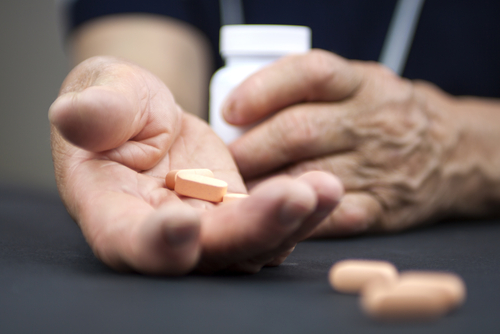New data analyses of two Phase 3 clinical trials evaluating the investigational therapy baricitinib for the treatment of rheumatoid arthritis (RA) symptoms have revealed promising results compared to conventional synthetic disease-modifying antirheumatic drugs (DMARDs).
The current RA treatment guidelines are based on the use of anti-inflammatory drugs, oral DMARDs such as Rheumatrex or Trexall, and injectable biological disease-modifying antirheumatic drugs (bDMARDs).
Despite their therapeutic possibilities, those drugs still don’t help many RA patients, so it is important to provide additional treatments that can improve patient care.
The trials RA-BUILD (NCT01721057) and RA-BEAM (NCT01710358), conducted by Eli Lilly and Company and Incyte, focused on the effects of baricitinib in the treatment of moderate to severe RA.
Baricitinib is a once-daily oral selective drug that inhibits the JAK1 and JAK2 enzymes. The JAK enzymes are important intermediates of inflammatory signals that have been implicated in the development of a number of inflammatory and autoimmune diseases. This suggests that JAK inhibitors can be useful tools for the treatment of inflammatory disorders, such as RA.
The new analyses on the collected data from RA-BUILD and RA-BEAM showed that baricitinib treatment resulted in improvements in RA symptoms across a diverse population of RA patients regardless of age, body mass index (BMI), and previous treatment with conventional synthetic DMARDs.
“Multiple patient characteristics may impact the effectiveness of rheumatoid arthritis treatment,” James McGill, MD, distinguished medical fellow and global brand development leader at Lilly Bio-Medicines, said in a press release.
“What these data showed is that regardless of a patient’s age, body mass index or previous experience with conventional synthetic DMARDs, treatment with baricitinib resulted in improvement in rheumatoid arthritis symptoms,” he said. “This gives us tremendous hope for how this oral medication may work in a real-world setting, if approved.”
These new findings were recently presented at the American College of Rheumatology (ACR)/Association of Rheumatology Health Professionals (ARHP) Annual Meeting in the following presentations:
- “Safety and Efficacy of Baricitinib in Elderly Patients with Moderate to Severe Rheumatoid Arthritis”
- “Effect of BMI on Baricitinib Efficacy: Pooled Analysis from Two Phase 3 Rheumatoid Arthritis Clinical Trials”
- “Previous Use of Conventional Disease-Modifying Antirheumatic Drugs and Response to Baricitinib”
Researchers found that upon treatment with 4 mg of baricitinib for 12 weeks, 67% of patients younger than 65 and 68% of patients 65 and older, showed a 20% improvement in RA symptoms (ACR20). In the placebo group, only 40% of patients younger than 65 and 43% of patients 65 and older achieved a similar response.
In terms of safety, the overall rates of adverse events (AE), serious AE, and serious infections were similar between the groups of patients treated either with baricitinib or a placebo.
These studies demonstrated that the proportion of patients who reached low disease activity or remission improved compared to a placebo regardless of their BMI.
Still, the effect of baricitinib in improving RA patients’ symptoms was higher in patients with a lower BMI, as was seen for other DMARDs.
Finally, treatment with 4 mg of baricitinib for 12 weeks was found to be effective in improving the symptoms of RA in patients in which standard DMARD treatments had failed. Overall, the number of previous conventional synthetic DMARDs used or the current use of oral corticosteroids did not alter the effectiveness of baricitinib treatment.
“These data add to the breadth of evidence supporting baricitinib’s efficacy profile across a wide range of patient populations,” said Steven Stein, MD, chief medical officer of Incyte Corp. “If approved, we believe that baricitinib has the potential to become an effective once-daily oral treatment option for patients with rheumatoid arthritis who may not respond well to other treatments — age, BMI or previous csDMARDs use notwithstanding.”


